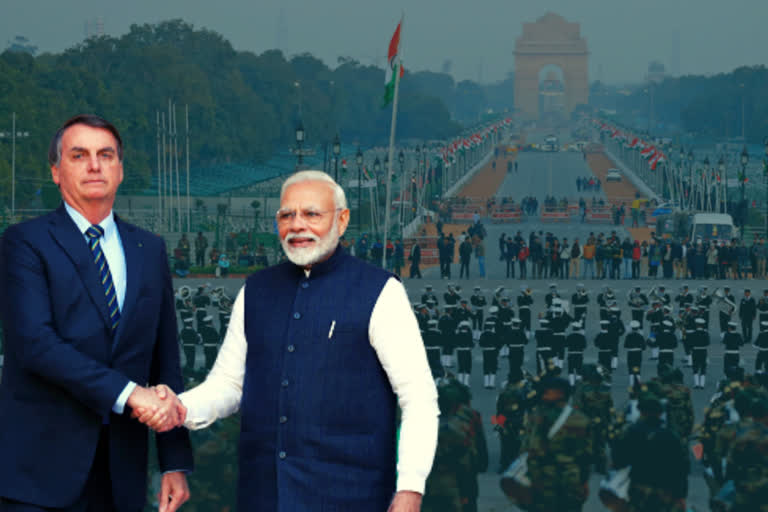New Delhi: “I present to you a new Brazil, resurgent after being on the brink of socialism. A Brazil being rebuilt on the aspirations and ideals of its people. In my government, Brazil has been working to reconquer the world’s trust, reducing unemployment, violence, and risk to business through de- bureaucratization, de-regulation, and especially through example,” said Jair Messias Bolsonaro, President of Brazil addressing the opening session of the 74th United Nations General Assembly in September last year.
A known opponent of socialists who rode to power in 2018 ‘to save Brazil from moral and multicultural degradation’ brought in by a liberal establishment, Bolsonaro further added, “My country has been extremely close to socialism, which has put us in a situation of generalized corruption, grave economic recession, high criminality rates, and uninterrupted attacks to the family and religious values which make up our traditions.”
The views of the President of one of the largest economies of South America (1.8 trillion USD) have stark shades of similarity with the leader up North whose election victory in November 2016 was as much of a Black Swan event for the world as was Bolsonaro’s win following judicial disqualification of Lula Da Silva in Brazil.
Both fought on anti-establishment planks, share right-wing populist ideological beliefs, love courting controversies and raining fire and fury on social media, both are climate change sceptics and no fans of immigration or minorities, and both have tainted financial legacies. No wonder then that while Bolsonaro is referred to as the Trump of the
Tropics, the sacked former US NSA John Bolton once quipped that Donald Trump could be referred to as the Bolsonaro of North America.
“Trump faced the same attacks I am facing- that he was a homophobe, a fascist, a racist, a Nazi. But the people believed in his platform. I was rooting for him. Just like he wants to make America great again, I want to make Brazil great,” remarked Bolsonaro during his Presidential campaign.
“The vision of an alternative nationalist world order that buries the liberal international order is a cementing factor whose value cannot be underestimated in the new direction that US-Brazil relations are taking,” writes Professor Sreeram Chaulia, Dean of School of International Affairs at the O.P.Jindal Global University in his book ‘Trumped- Emerging Powers in a Post-American World’.
In his chapter on Brazil, Chaulia details how unlike his past predecessors Goulart, Cardoso or Lula, Bolsonaro has taken Brazil from wary rivalry to a willing partnership and an unprecedented alliance with the United States reminiscent of the Cold War era.
Early Life
Born in 1955 to a dentist father who reportedly practised without a degree and later shifted to prosthetics, Bolsonaro grew up with five siblings in Eldorado, a small town in the Atlantic rainforest of the Latin American nation.
He graduated from the Agulhas Negras Military Academy in 1977 and rose to the rank of a Captain after serving the army for 17 years including a stint as a paratrooper.
In 1986 he courted one of his earliest controversies by penning an article critical of the military’s pay system for the popular magazine Veja that resulted in some condemnation from his superiors but the support of other officials and families.
After leaving the Army in 1988, Bolsonaro’s political innings began with a seat won on the Rio de Janeiro City Council in 1988 and later in 1990 a seat in Brazil’s federal Chamber of Deputies that he held for seven consecutive terms. And in 2016 he suddenly emerged from a fringe lawmaker to the highest office after Lula was disqualified following a criminal conviction over corruption charges.
Many Shades Of Controversies
65-year-old Bolsonaro, leader of a democracy with a population of 210 million, for long advocated the return of military rule era to Brazil. No stranger to controversies, Bolsonaro is the antithesis of the left and a known conservative. His several controversial remarks include his statement that he “would be incapable of loving a homosexual son” and that he would prefer his son to die in an accident rather than “ show up with a mustachioed man.”
More recently, when a female member of the Chamber of Deputies Maria da Rosario called him a rapist, Bolsonaro responded by saying, “I wouldn’t rape you because you don’t deserve it.” Later while stating he is not a rapist, he added further insults in his so-called clarification by saying that, ‘if he were, he would not rape the congresswoman in question’ because she was “not his type.” In 2015, amid an ongoing international refugee crisis, Bolsonaro infamously called refugees as ‘scum of the earth’.
Read also: Brazilian Prez tells reporter he "looks homosexual"
The labels of misogyny, sexism stick with both Trump and Bolsonaro in a way they could not care less about. And while the temperamental Donald Trump declined the invitation to be the Chief Guest for Republic Day 2019 citing domestic schedules, Prime Minister Modi is playing host to President Bolsonaro this year as Indian troops parade down Rajpath displaying the country’s mighty military glory.
Bolsonaro is the third Brazilian head of state after 1996 and 2004 to be Chief Guest for the Republic Day Parade. Incidentally in 2019 Brazil also led a sustained campaign under Bolsanoro alleging India of violating permissible limits under WTO (World Trade Organisation) regulations in extending support to its sugarcane farmers.
“President Bolsonaro is an elected leader in a democratic country which is emerging power in the region. It is the country with whom we have very strong and substantive relations, many areas of convergence that we have between India and Brazil. We give great importance to engaging with Brazil and its leaders to take forward areas of convergence and to build our relationship,” said Vijay Thakur Singh, Secretary (East) in the Ministry of External Affairs ahead of Bolsanoro’s India visit.
Read also: Brazil's ex-president Lula released from prison
